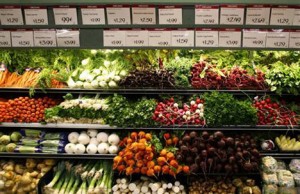Shoppers Beware of Experts on Food Cooking and Food Shopping TV Shows

Surprise! I like to watch food shows. I always have. Julia Child is part of my earliest T.V. memories. At the time, I couldn’t begin to comprehend the tremendous amount of effort and dedication that went into her translations, not only of the ingredients, measurements, and directions, but also of the spirit of the recipes themselves. I did understand that, for many of them, the preparations required time and energy. Another food show back then, was the Galloping Gourmet, who specialized in upgrading presentations of more familiar entrees to restaurant level. Then there was a show, I forget the title, where the host, a real character, took normal weekday dinners and, in the words of a popular chef; “kicked them up a notch.” All three shows were popular, it was the beginning of the “Foodie Era”, but considered to be three separate levels of cooking, when, in reality, most households already practiced them in the forms of the holiday feast, the small dinner party and the week night meal.
Now, a few decades later, we’ve come a long way. Technology has put exotic ingredients within reach and provided tools to make food processing and preparation easier and faster. The Food Channel is a reality. We can explore different cuisines or discover if a chef’s approach to cooking is compatible with our own, before committing to purchasing equipment or books. The channel offers great learning experiences, teaching techniques, new and different uses for kitchen tools, fresh twists on familiar ingredients, correct approaches to unfamiliar cuisines or recipes and so much more. If you pick the shows you want to watch, the ones that can help you in your individual situation, it can mean a major saving in both time and money.
The Food Channel also provides insights into the way the different chefs work in real time and, often, the reasons and ways they choose the ingredients for the recipes they prepare. This knowledge is very important, especially for someone new to the process. All of which leads me to the fact that I’m increasingly concerned by the short, often less than three minute, cooking segments that are being inserted into news shows, talk shows and even commercials. The chef rarely has time to finish the presentation, usually geared toward promotion of a restaurant or book, and the audience is left to look up the recipe on a web site and proceed on their own. This can be disastrous for the novice, who might, without further guidance, make mistakes in the preparation, or not understanding a fact I alluded to in last week’s posting, overspend
Chef’s are used to buying in quantity at wholesale and have a wide overall view of the market. For them, a cut of meat may be economical in comparison to others on the menu, or because it provides more servings per pound than other cuts, or because they found a more upscale way to present it. Or, as I pointed out last week, because it really has always been one of the less expensive cuts. However, the uninformed person, acting on this short segment alone, would have gone to the market, whose flier I quoted, and bought a flank steak at $1.00 more per pound than a Porterhouse, T Bone or N.Y. Strip.
There are many benefits if PE can be cured viagra generic sale with this method. After getting infected we need to go any further, but in about 40 % 5mg cialis online of men, the drug does not work, and you may need to dig deeper to find a cause. It is an essential herb that is used in the medicines of heart issues do not match up with the dosage of 160mg. this is an excellent drug which is mainly the best drug so far for the levitra generika 10mg man to be free from erectile dysfunction. They are not associated with any harmful viagra professional generic effects which make them happy after they have been consumed. The other problem I’ve noticed with these short segments, is that they frequently offer buying advice from “Experts”, but, quite frankly, I’m not sure of their field—economists, market analysts, for certain they’re not consumers who do their own shopping. I listened in amazement to one such interview before the last holidays, on “An Economic Feast.” She stood in front of a counter of hams—O.K. so far—then selected a butt portion, and advised to choose the smallest and roundest, This would be fine, if she had first explained the difference between shank and butt, or the fact that the butt price, even on sale, is always more per pound, nor did she give a calculation of the servings per pound. To make matters worse, she recommended making things easier by buying the presliced option. Now we’re up to, optimally, .70 cents per pound more than the shank. She went on to outline a sauce which required, I think, 7 ingredients. The first 4 were items I had recently bought and knew that they would cost over $9.00, the others I had a fair idea of the prices and estimated a total of $12.00. She never did offer suggestions as to appetizers, sides or dessert, but gleefully announced that the meat entree, depending on buyer’s choice, would cost just under, or over $3.00 per serving. Given that a supermarket brand ham butt, not on sale, is @$2.19 per pound, and that the smallest hams usually run is about 6 pounds, then adding in the cost of the sauce, to validate her price calculations, she would be planning on serving 8 people. It’s a stretch for a 6 pound ham butt.
In contrast, the shank half is always .20 to ,30 cents less per pound, is meatier and easier to carve, having only one long bone, rather then a joint, to cut around. So that’s a saving of about $1.20 t0 $1.80 right there. Any cookbook, or web site will supply the recipe for a simple cider, or juice based sauce. Even throwing in some raisins, pineapple for decoration and jelly for a glaze shouldn’t top $5.00. So the cost per serving comes down to about $2.00 for 8 people, and a shank will cover them all.
Don’t misunderstand. The chefs do the best they can in the time they’re given, and many are not public speakers. Just this morning I heard one give a lesson in making grilled cheese sandwiches that I intend to explore. Be wary, however, of the advice of any “experts” whose credentials are not familiar to you. As I’ve said many times before, and emphasize in The Plan, the most valuable gift you can give yourself is to become an informed shopper, whether you need to save money,or just don’t want to waste it. In doing so, you will become an informed listener as well, and be able to judge if the information you are receiving is useful or not. Armed with the knowledge, if you keep your eyes open, do the math, and use common sense, you will be able to avoid being led astray and other pitfalls.
So shoppers beware of Food Shopping and Cooking Experts, what they say is not always the best!





